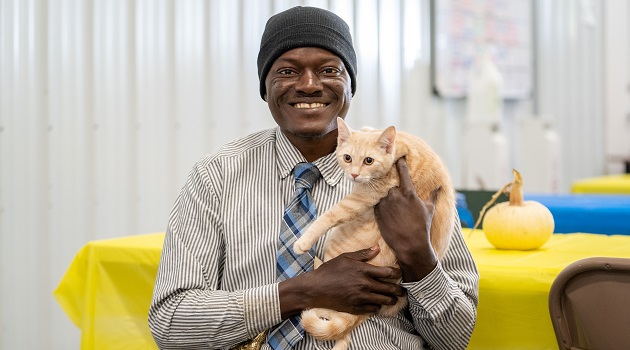Columbia officials aim to leave no one behind as they celebrate the first anniversary of Rapid Shelter Columbia with music, food, and a reunion of residents and community partners.
When it launched a year ago, Rapid Shelter Columbia was the first community of its kind in the Southeast. The idea was simple. Give people the transitional shelter, support, and sense of security they need to recover and reset their lives.
“At the end of the day, getting people into temporary housing allows us the opportunity to connect them with the resources they need,” said Mayor Daniel Rickenmann. “Rapid Shelter Columbia has given us a touchpoint for wraparound services to transition individuals into permanent housing and have the opportunity to live the life they deserve.”
Different from ordinary shelters, Rapid Shelter Columbia is a cluster of 50 pallet units where residents get their own private space, bed, and storage. Just 64 square feet, these pallets are built for maximum efficiency, enabling the City of Columbia to help as many people as possible.
“As it turns out, the small safe space was exactly what residents needed to feel a sense of ownership, helping them transition to permanent housing,” said Teresa Wilson, City Manager. “This remains our ultimate goal.”
“It ain’t so much space, but it’s your space,” said one former resident.
Homelessness on the Rise
Nationally, homelessness has been on the rise since 2017, up six percent overall. Cities with high housing costs top the list for likelihood of homelessness. By comparison, South Carolina – and the state capital Columbia in particular – remain much more affordable.
In South Carolina, about 4,287 people were homeless in 2002, which is about eight for every 10,000 people. This places South Carolina low on the list of states with high homelessness, 11th overall. According to the U.S. Department of Housing and Urban Development, Columbia/Midlands saw a 64 percent decrease in its unsheltered population between 2007 and 2022. Despite these statistics, City of Columbia officials acknowledged and were determined to focus on a growing population of the chronically unsheltered in the City.
A short-term fix with long-term gains
Rapid Shelter Columbia is a carefully considered and constructed community that extends far beyond the walls of each pallet unit. Here, residents receive personalized job and housing assistance through the City of Columbia’s team of specially trained case managers. Food and access to medical and mental health services are also available through a network of recovery and healthcare partners. Laundry, showers, and grooming supplies give residents a fresh start on their new path in life.
“People are at the heart of our community,” said Mackin Wall, Project Manager. “Rapid Shelter Columbia depends on a network of qualified and compassionate partners to help get residents the specialized assistance they need, whether it is grief or recovery counseling, medical care, or mental health support, in addition to things like finding a job, learning new skills, or accessing documentation.”
MIRCI helps vulnerable adults who need immediate and continuing life assistance due to mental illness, specifically those experiencing homelessness and those at-risk of homelessness. MIRCI’s clinical and support programs help people build healthy and independent lives. In addition, MIRCI provides permanent, supportive, subsidized housing.
LRADAC, The Lexington/Richland Alcohol and Drug Abuse Council, is a non-profit agency that offers a wide array of prevention, intervention, and treatment programs to fight addiction and drug misuse.
Prisma Health’s Program of All-Inclusive Care for the Elderly (PACE) provides all-inclusive care for the elderly in Richland and Lexington counties. It focuses on both chronic care needs and preventative care.
The proof is in the numbers
As of October 2023, Rapid Shelter had received 504 referrals from the City of Columbia Police Department, Richland County Public Library, other agencies, and community organizations. Of those, 188 people qualified for admission into Rapid Shelter Columbia. Residents go through a screening process to determine whether they meet the qualifications for being chronically unsheltered, as defined by being homeless for a consecutive year or four separate times in three years.
Real people with real-life results
City of Columbia officials were hopeful, but admit they had some doubts about whether 90 days could change lives, helping keep people off the streets and out of jail. It turns out, that is exactly what they did with 34 residents transitioning to permanent housing.
“I’m incredibly proud of each and every one of them,” said Nyasia Franklin, Program Specialist. “They overcame incredible odds, and found the confidence, support, and resources they needed to move off the streets and into permanent housing.”
Around 50 percent were diagnosed for mental health issues, and another 35 percent for substance abuse disorder. Thirty-two percent had a physical disability, and 28 percent a chronic health condition.
Walker came to Rapid Shelter Columbia in January of 2023. She was struggling with homelessness and alcohol abuse. Her Rapid Shelter Columbia case manager connected her with MIRCI and LRADAC, the latter of which helped her into a five day detox program, which she successfully completed. She was able to find a job, save money, and participate in peer support groups. Walker says a pivotal moment was sitting down with her case manager to come up with specific goals, knowing someone believed in her strengths to want to do better. Walker was permanently housed on August 31, 2023.
Allen came to Rapid Shelter Columbia in November 2022. While at Rapid Shelter, he connected with LRADAC and Cooperative Health to help get him started on a new path of life. Unfortunately, his addiction got the better of him and he ended up leaving the program in January. This April, Allen returned to the program sober and ready for change. His Rapid Shelter Columbia case manager referred Allen to LRADAC and Narcotics
Anonymous/Alcoholics Anonymous peer groups to manage and maintain his sobriety. He worked closely with Prisma Health for grief counseling and primary care needs. He joined the JOBs program, gaining valuable skills and employment. Allen was permanently housed in September 2023.
Gordon came to Rapid Shelter Columbia on November 2, 2022, the second day it was open. When Gordon arrived it was clear he was suffering from a medical issue, which the team later learned was Parkinson’s disease. His case worker describes him as a kind and gentle man, who always offers to help and never complains. Rapid Shelter Columbia partnered with Prisma Health’s PACE program to provide Gordon with all-inclusive care. Prisma Health picked him up for his appointments, made sure he saw the doctor and received the care he needed, and provided his medication free of charge. Gordon recently moved into a retirement home in West Columbia.
“These success stories give us all hope and remind us to never give up on our goals, no matter how unattainable they may seem,” said Kameisha Heppard, Director of Homeless Services.
Photo – Current Rapid Shelter Columbia resident Fred with his emotional support animal Draco


